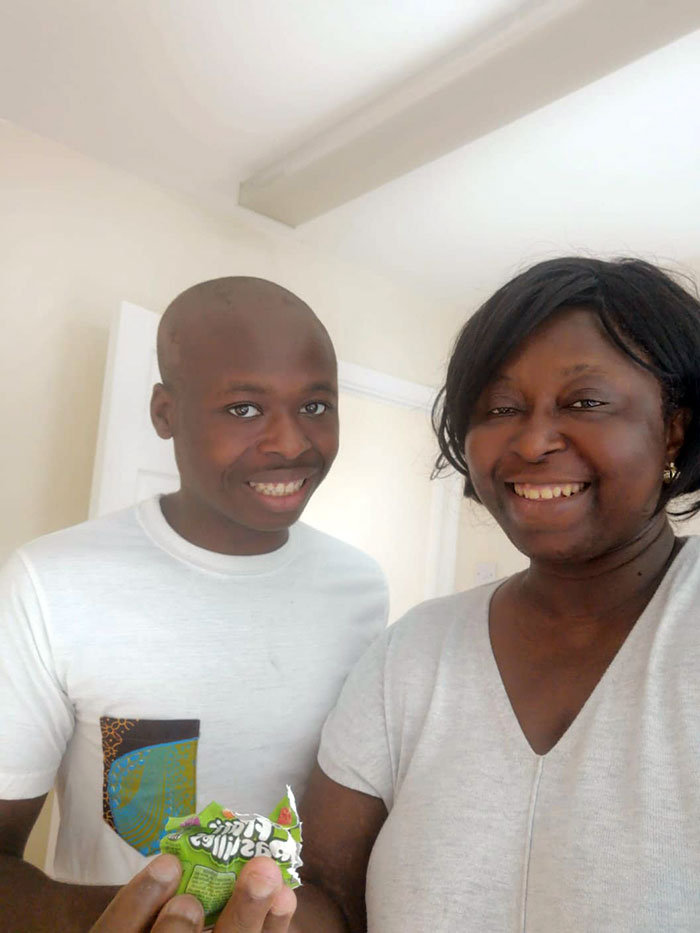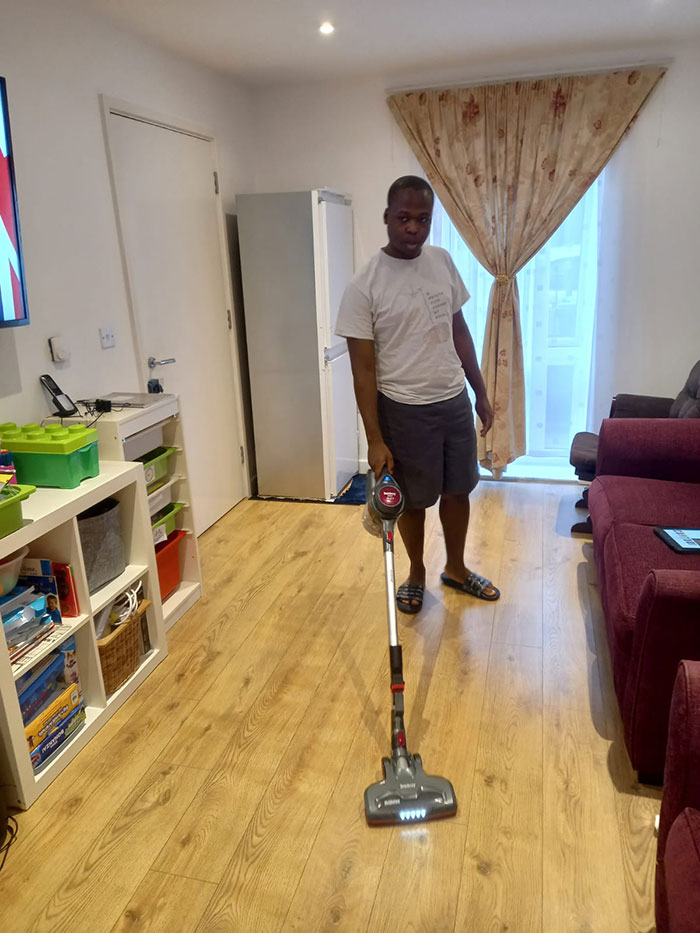Having lived in the UK for more than 20 years, one summer Hannah Otoo and her young family went back to Ghana so her parents could meet their grandchildren.
Rex, her autistic son with a learning disability, was nine at the time. Having battled with the special educational needs and disabilities (SEND) system at home to get her son’s needs assessed and met, Hannah was shocked by the apparent lack of understanding and the paucity of specialist learning disability or autism education and support in her native land.
“I saw all that need, and I thought “oh my gosh!” It was the first time I realised that Africa didn’t have anything. My parents didn’t understand anything,” she says.
Hannah soon met other desperate parents of children with similar needs who were struggling. It was then that an extraordinary thought came to her: to turn a house they owned in Ghana into a school for autistic children.
She immediately set about converting the house and, when she came back to London, mentioned her ambition to the headteacher of her son’s specialist primary school – Paddock School in Wandsworth, London.


The headteacher’s reaction was equally extraordinary: “She was fantastic and so excited. They were moving accommodation, so they shipped all their old stuff, the sensory room, everything to Ghana.”
Hannah employed staff locally and arranged for teachers from London to come to Ghana to train them.
Reyo Paddock School Ghana first opened its doors in May 2011 (www.reyopaddock.com). Hannah would run the school for the next 10 years.
Back in London, as Rex transitioned to specialist secondary school, his behaviour became more challenging for teachers and family. Hannah, like many parents of children with SEND, was finding respite support impossible to get.
It became particularly difficult to keep Rex safe and happy during school holidays so, every summer, Hannah took him to Ghana so that he could benefit from the structure of Reyo Paddock and spend time with his Ghanaian family.
These were precious moments for him: “He loved the music, he loved the food, he loved the environment – and so he saw his culture.”
Back in the UK, Hannah began setting up a small charity, SEN Parenting (www.senparenting.org), to support families in similar situations. Her aim was to help schools and families to work together to create consistency between home and school approaches, with simple support systems at home.
Hospital after an ‘incident’
Finding homes for supported living can be difficult. Lisa Brown is bringing property investors and care providers together to design and create accommodation to meet various needs.
One year, just after she had returned to Ghana, Hannah received a call from Rex’s school. There had been an “incident” and they had taken him to the accident and emergency department, where he was sectioned. It was Rex’s 18th birthday.
“I left on Saturday and the next day Sunday that’s when they took him,” Hannah recalls.
“He spent one or two nights in the A&E, and they saw they couldn’t contain him there. And this is an autistic boy who needs to run.
“When he gets confused, he rips his clothes and destroys things – not in the sense that he wants to destroy things, but he can’t communicate as he is non-verbal. He is not able to express his frustration, so this is how he shows it.
“That’s when they used medication to suppress him.”
Hannah jumped on a plane back to London. When she arrived, Rex had been moved to a secure inpatient unit. Knowing what helped her son when he was feeling distressed, Hannah dashed home to pick up her crisis resources (sensory and visual supports), cooked his favourite meal and drove straight to the hospital.
When she got there, it was as if her son and his family had entered a different world.
She explains: “So many things come into play when you are 18. You have to look at capacity. The law changes. Child and adolescent mental health services cease at 18. There just wasn’t that transition for him… He entered into an adult zone and it was the weekend as well. Information was not being transferred.”
Thankfully, Hannah had brought the thick file she had kept with Rex’s reports and shared it with staff. They watched her putting in place the calming strategies that helped him – a combination of communication support, his favourite food, water, music, aromatherapy and other calming activities – and saw they were working.
Rex uses Makaton signs to communicate and was signing “toilet” but the ward nurses did not recognise this so were not responding. Hannah therefore found herself training the nurses in Rex’s most frequently used signs.
She also explained how running around and standing under a shower (15-20 times a day) would support his recovery.
“There was a good ward manager who allowed it, who wasn’t somebody who thought, ÔOh you don’t know much’ They listened and we worked together,” she says.
After a few days, with Hannah coming in to support him daily, the multidisciplinary team saw Rex improve dramatically.
By the end of the first week, the psychiatrist said Rex had stabilised, was responding well to medication and was ready for discharge. The hospital’s proactive ward manager escalated Rex’s case within the NHS and the London lead, Adanna Williams, became involved.
Williams listened to the family and respected their expert knowledge of their child and was, in Hannah’s words, “really instrumental in getting everyone to do what they were supposed to do”.
This meant that Rex was discharged from hospital in two weeks, rather than 5.6 years – the average length of stay, according to NHS Digital figures from 2020.
A new home
Finding homes for supported living can be difficult. Lisa Brown is bringing property investors and care providers together to design and create accommodation to meet various needs.
Four months after discharge into short-term provision in Kent, Rex had his first care, education and treatment review. His social worker suggested a care provider that she had worked successfully with in the past, Right Support Management (www.rightsupportmanagement.co.uk).
They identified a three-bedroom property 20 minutes from the family home that could accommodate Rex, his 2:1 support and an overnight carer. They provided the tenancy and the care team, carefully selecting staff with the right skills to work with Rex and collaborating with the family from the outset.
“We the parents were working with him throughout from day 1,” says Hannah. “We explained Rex’s childhood, his past, what he likes, what triggers him, how he communicates And they took it all in. We are fully part of the care team.”
The care provider worked with the family to adapt the house to meet Rex’s needs – latches on windows, wipeable flooring and boxing in potentially hazardous items.
They installed a sensory light system that he could control, and important areas and items were labelled with PECS symbols. Most importantly, the layout of the furniture accommodated Rex’s sensory and self-regulation needs.
“Every day, he needs to run round a lot just to release energy. He has a little soft area where he can bounce on his ball a space so he can run around a little garden We are planning to get him a swinging chair to give him sensory input.”
The provider listened and took on board Hannah’s expertise in her son as well as her professional knowledge. She taught Rex’s staff how to use calming strategies and cook his favourite meals.
Thanks to this partnership working, Rex’s transition to his new home went well. He is now an active member of his community.
His week is planned with activities he enjoys – visiting local shops to buy the African foods he loves, learning how to cook, trampolining, going to the park and restaurants and seeing friends he has known since childhood at Bible meetings.
Expertise benefits others
Finding homes for supported living can be difficult. Lisa Brown is bringing property investors and care providers together to design and create accommodation to meet various needs.
Determined to use her expertise and the knowledge gained throughout Rex’s journey, Hannah decided to help other families whose loved ones’ needs meant that they required bespoke programmes.
As if a foundation in Ghana and a UK charity were not enough, she has established SEND UK Solutions (www.senduksolutions.org). SEND UK Solutions and the family designed Rex’s bespoke adult learning programme to develop his numeracy and literacy, as well as skills for life in areas such as laundry and healthy eating. SEND UK Solutions works with Axcis Education (www.axcis.co.uk) to provide his personalised education programme.
She continues to run SEN Parenting, which runs workshops, informal meetings, wellbeing sessions and a WhatsApp group. More recently, she has been working on crisis prevention with NHS England and voluntary organisation A2ndVoice (www.a2ndvoice.com), running training for black and minority ethnic families with children and young people who are autistic and/or have a learning disability.
“Because of my experience in Ghana and cultural background, I know the main problems that affect stigmatisation, the family not accepting. They can look down on people with disabilities and feel they are not supposed to mix with them or they have to Ôgo back to the gods’. It’s that community thinking that it’s a curse so you have to have prayers or something,” she says.
“They [services] say it’s bad parenting skills and the barrier of communication as well In my experience, training can work for not only the mums and dads but also the wider family So, when they accept it and they understand, they know how to help them and then they respond.”
For Hannah and her family too, there has been progress: “It’s like a dream come true. He’s much more settled and smiley and much more able to engage and learn Although he has his needs, we’ve created the house to accommodate his sensory needs and his communication needs it’s bringing the best out of him.”
Although Rex’s needs have been described as complex, the key things he needs for a safe and happy life in the community are simple, as Hannah explains: “Living with people who understand him and want to make him happy, who will work hard to get the best out of him, interact with him and see him as a person. And family being part of his everyday life. Getting close to the family – that’s the number one.”
This is the second article in our series on a positive life after assessment and treatment






